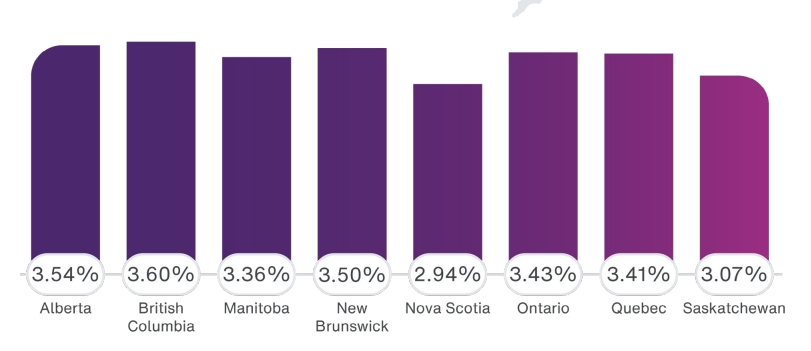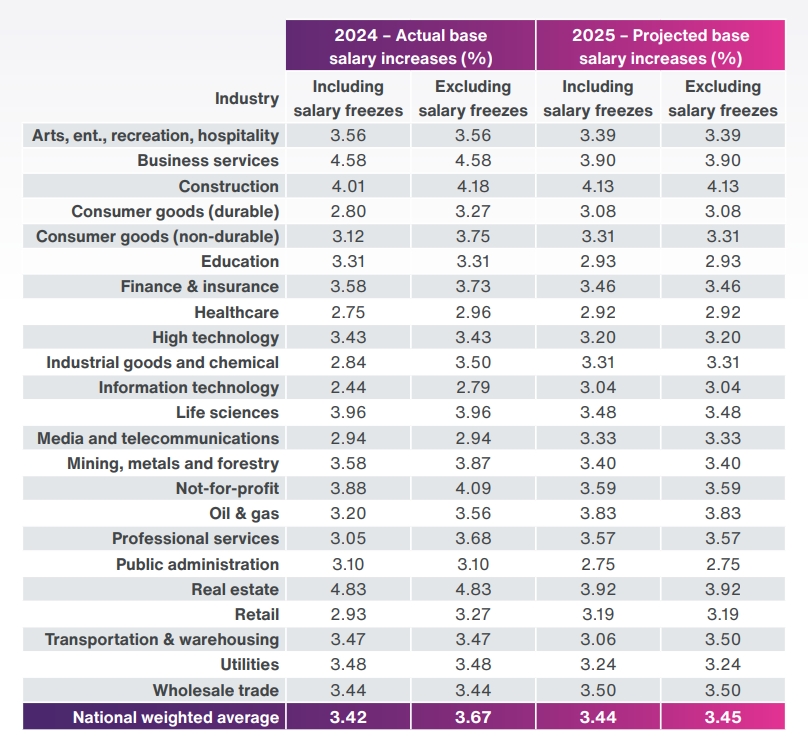Which regions and sectors are expected to see the biggest gains?

TELUS Health is forecasting a 3.45% increase in average base salaries for non-unionized workers in Canada for 2025.
This is expected to outpace inflation for the first time in four years, mainly due to ongoing labour shortages. According to the Bank of Canada's recent report, the projected salary increase surpasses the country's current inflation rate of 2.0%.
“The persistent demand for skilled talent is driving robust salary growth into 2025, despite easing inflationary pressures on employers,” said Guylaine Béliveau, National Practice Leader of Compensation Consulting at TELUS Health.
“As inflation rates decline, employees stand to reclaim purchasing power lost in recent years. This shift could significantly boost individual financial wellbeing and overall workplace morale.”

With respect to salary structures in Canada, the forecasted increase for 2025 (2.72 per cent) is slightly lower than the actual increase implemented in 2024 (2.89 per cent).
Overall in 2024, 16.2% of participants applied a salary range structure freeze. Ontario saw the largest number of salary range structure freezes with 22.0% indicating “yes”. In 2025, 6.8% of the participants plan to freeze their salary range structures, says TELUS Health.
Regional, sectoral differences for salary increases
British Columbia is expected to see the highest salary increase in 2025, with a growth of 3.6% in average base salaries. Alberta is a close second with a projected increase of 3.54%, while New Brunswick is forecasted at 3.50%.
Nova Scotia consistently shows the lowest projected increases among provinces with statistically significant data at 2.94 per cent for both 2024 and 2025, finds the TELUS Health survey of 356 employers across Canada, finds TELUS Health.
From an industry perspective, the highest projected increases for 2025 are expected in Construction (4.13 per cent), Real Estate (3.92 per cent) and Business Services (3.90 per cent). These same three industries also led salary growth in 2024.
For 2025, the lowest salary increases are expected in Public Administration (2.75 per cent), taking the place of Information Technology, which held that position in 2024.

Focus on financial wellbeing
Additionally, 59% of organizations have either implemented or plan to implement programs to enhance employees' financial wellbeing. Some of these include:
- healthcare spending accounts (24% of organizations)
- financial literacy education (20%)
- group RRSPs (18%).
“In today’s evolving job market, employees are seeking more than just competitive salaries,” says Philip Mullen, Vice President of Employer Solutions Consulting at TELUS Health.
“They’re looking for employers who offer comprehensive support for their financial, physical, and mental wellbeing. Organizations that partner with benefits administrators to create holistic packages—integrating retirement planning, investments, and health services—are likely to see improved recruitment outcomes, higher retention rates, and enhanced productivity.”
Other salary surveys for 2025
The national average base salary increase for 2025 is projected at 3.6%, excluding planned salary freezes, reports Eckler. That marks a drop from projected increases of 4.2% for 2022 and 3.8% for 2023. The company’s projected increase for 2021 was 3.1%.
Canadian employers are expected to lower their overall salary increase budgets in 2025, according to a survey by Normandin Beaudry, which gathered data from more than 750 organizations across the country, and revealed that average salary increases are projected to be 3.4 per cent, down slightly from 2024’s 3.6 per cent.
Canadian organizations are adjusting to current job market and economic conditions by adopting new strategies for salary planning, according to a Gallagher survey, which found p for 2025 show a further decline, with expected increases of 3.5%




